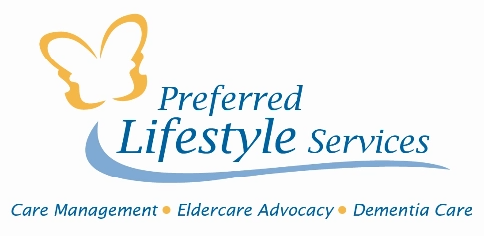Care Management • Eldercare Advocacy • Dementia Care
Care Management • Eldercare Advocacy • Dementia Care
Alzheimers Factoids
1. Direct costs of caring for Americans with Alzheimer’s & other dementias are estimated at $200 billion in 2012.
2. Alzheimer’s is the 6th leading cause of death in the US and only cause of death among the top 10 that can’t be prevented or cured.
3. From 2000-2008 death rates for heart disease, breast cancer, stroke, and HIV/AIDS declined, but deaths from Alzheimer’s disease increased 66%.
4. App. 800,000 people with Alzheimer’s live alone; half of these people have no identifiable caregivers to help prevent malnutrition, self neglect, wandering from home, and dementia-caused accidents.
5. Over 50 illnesses have Alzheimer’s-type symptoms. For an accurate diagnosis see a board certified neurologist specializing in dementias.
6. Alzheimer’s prevents the brain from processing & storing new information in memory. This causes “short term” (recent events) memory loss.
7. People with dementia may or may not have Alzheimer's, but everyone who has Alzheimer's will suffer from dementia.
8. Senility=cognitive impairment that may occur with aging. Alzheimer's is a progressive brain disease that slowly kills brain cells.
9. Dementia from malnutrition, medication, depression is reversible. Alzheimer's is fatal. A diagnosis from a dementia specialist is vital.
10. 5% percent of people between 65 and 74 have Alzheimer's, with the risk doubling every five years after age 65, After 85 the risk is almost 50%.
11. The greatest risk factor for Alzheimer’s disease is age, but Alzheimer’s is a not a part normal of aging. No disease is considered a “normal” part of life.
12. Dementia is not a disease. It's a catch-all terms for a group of symptoms that are caused by over 50 diseases or conditions. Alzheimer’s causes 70% of dementias.
13. Mental decline in Alzheimer’s shows up first as loss of memory function. Next to be affected are emotions and inhibitions.
14. Alzheimer’s brain lesions (amyloid plaques and tangles) cause a decreasing ability to cope with everyday life as brain cells die.
Contact Us
Prefered Lifestyle Services
Services
Stay Connected
Sign up for our Email Newsletter
Email Newsletter Sign up
Thank you for Signing up!
Please try again later.

